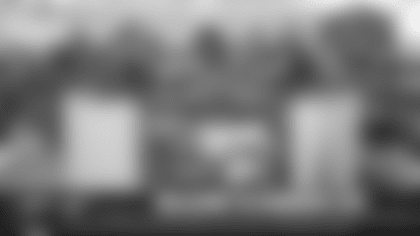Joe Whitt Jr. doesn't know exactly where the lapses in communication came from during the Washington Commanders' 37-20 loss to the Tampa Bay Buccaneers. He doesn't expect them from his players, and up until the 2024 season opener, his unit hadn't made them, at least not any glaring ones.
Still, those communication errors happened, and Whitt is determined to fix them before his defense takes the field again.
"The standard is the standard," Whitt said.
Whitt gave credit to the Buccaneers, a four-time playoff team, and Baker Mayfield for executing their game plan on Sunday. He also acknowledged that his defense didn't do itself any favors, as they allowed the Tampa Bay offense to convert 69% of their third downs, score on seven of their nine drives and hit nine plays of at least 15 yards. Miscommunication, among other issues, was at the center of those mistakes. Whitt, and his players, know it's on them to figure out a solution.
"We gotta do -- I gotta do -- a better job of demanding it and I hear it the way that it should be said in the walkthroughs and in practice," Whitt said. "Hopefully, that translates to the game."
Part of the reason why the Commanders' coaching staff was so confident about how the players responded to the new scheme stemmed from how well they had communicated during training camp. Head coach Dan Quinn said that people can hear a good defense before they see the results. Things weren't perfect in the preseason, but the way the players were communicating before and after the snap was an encouraging sign that they had a foundation to build upon.
That did not happen in a game that counted, though, and it directly led to points for Tampa Bay. Jalen McMillan, who missed on two potential touchdowns in the first quarter, got behind the Commanders' secondary for an uncontested 32-yard touchdown. Rookie cornerback Mike Sainristil was the closest defender on the play, but it looked like he was expecting help from safety Jeremy Chinn.
McMillan's touchdown came on third down, where most of Washington's communication errors occurred on Sunday. They had too many players on the field on a third-and-11, which bumped the Buccaneers up five yards and was followed by a 24-yard pickup from Mike Evans.
Quinn said during his Monday press conference that the pre- and post-snap communication in the second "wasn't as strong as it needs to be."
"We're gonna establish that we can do this type of communication all the time correctly," Quinn said.
Whitt made it clear that it's on the coaches to make sure the players are playing fast and on the same page, rather than overthinking things, but the players are taking responsibility for their problems as well. Benjamin St-Juste said in the locker room that the defense "beat ourself" because of the lack of communication. Players can get so locked in on wanting to make a play, he added, that they can forget to communicate at times.
So, when the Commanders face the New York Giants on Sunday, he intends to correct that mistake.
"Next game, I'm talking every play, even if it's the most simple thing that we all know," St-Juste said. "We're all going to be talking, and we're going to definitely at least eliminate two or three big plays."
Sainristil is on board with that, saying that building strong communication starts in the film room.
"What we see on film, we have to talk it out in the meeting rooms, and we gotta take that from the meeting rooms to walkthroughs, from walkthroughs to the practice field, from the practice field to the game," Sainristil said. "Just getting comfortable with what we're seeing."
It's not like Whitt is going to let them forget about emphasizing good communication skills, either. He stands far behind the defense during team drills, and he wants to make sure his players are speaking loud enough for him to hear exactly what they're seeing and how they respond to different looks.
Whitt doesn't just want to hear his players speaking loudly, though; the entire defense needs to hear the communications and acknowledge them.
"You have to make sure he's received it, he's acknowledged it, and now we're on the same page. That's the key part of it's just making sure that we're doing it, and not taking anything for granted, which we didn't," Whitt said. "But when you don't get the results that you're expecting, you have to look at what you're doing to make sure that you're doing the right thing."
Whitt and Quinn also want to make sure they're making the concepts easier for their players. Quinn referenced a conversation he had with former head coach Tony Dungy, who believed that it was more effective to simplify a scheme, rather than add to it, when there were problems with communication on his defenses.
"I think it was probably true back then and it's still true today as you're getting into the season," Quinn said. "Let's make sure you nail this every single time."
As encouraging as it is to Whitt and Quinn that the defense is communicating well in practice, it doesn't matter much to them if that doesn't carry over to games. The level of communication has to be the same, regardless of whether it's on Sunday or during the week, and he puts the responsibility upon himself to make sure it's more consistent.
"Hopefully that translates to the game," Whitt said, "because that's the only thing that matters."
The players believe the early mistakes are correctable.
"I think a lot of it was not being on the same page as far as whatever our checks were going to be," Sainristil said. "I take a lot of accountability. I'm playing the 'star' position. I'm the primary communicator, so I think I didn't do a great job of communicating as well as I was doing throughout the week. I already told the guys I gotta do a much better job of being loud, clear and decisive about what checks I'm making."
And Quinn expects it to be better.
"I expect that communication to really ramp up, pre- and post-snap," Quinn said. "It's such an important part of what we do. So, when it doesn't go like you want from a communication standpoint, you emphasize it more."














